Without any use of Egyptians, Persia is subjugated by the Macedonians.
Alexander’s Mother
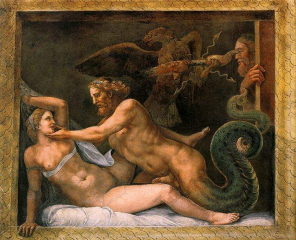 The choice of Macedonia and Epirus proved to be an inspired choice. Epirus, was located in what is today Albania. A result of the marriage of an unknown Egyptian Princess to Neoptolemus, King of Epirus, resulted in the birth of a daughter, Polyxena. The choice of name itself is interesting as the original Polyxena, a Trojan Princess, was sacrificed by the original Neoptolemus at the demand of his father Achilles’ ghost after the Trojan war.
The choice of Macedonia and Epirus proved to be an inspired choice. Epirus, was located in what is today Albania. A result of the marriage of an unknown Egyptian Princess to Neoptolemus, King of Epirus, resulted in the birth of a daughter, Polyxena. The choice of name itself is interesting as the original Polyxena, a Trojan Princess, was sacrificed by the original Neoptolemus at the demand of his father Achilles’ ghost after the Trojan war.
However this later Polyxena who became known in in later life as Olympias, then married Philip of Macedon. Olympias gave birth to Alexander the Great.
Both Olympias and Alexander always maintained that he was fathered by the Egyptian god Ammon, father of the gods, not by Philip.
The Horned God
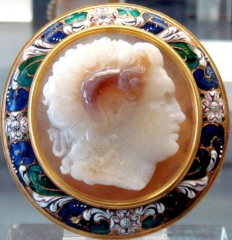 Ammon is always depicted as having Ram’s horns growing out of his temples. The Jewish records certainly maintan that Alexander had horns! The majority but not all, of the images of Alexander, particularly his coinage, show the horns!
Ammon is always depicted as having Ram’s horns growing out of his temples. The Jewish records certainly maintan that Alexander had horns! The majority but not all, of the images of Alexander, particularly his coinage, show the horns!
Alexander honoured his birthright! He attacked and defeated the Persian Empire. This event has been largely celebrated in western history but one result was that Alexander ended the practice of pure Zarathrustrian ethics.
Ptolemy
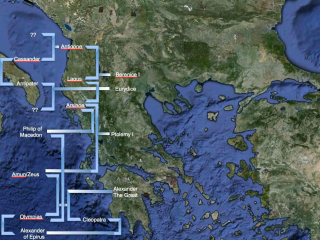
Philip of Macedon was used yet again by the Egyptians. Another wife, Arsinoe, was rejected by him when she was pregnant and was then cared for by Lagus, a relatively undistinguished citizen. This child was Ptolemy who became the constant companion of Alexander. Perhaps Alexander knew his true parentage, perhaps he was his half brother! Perhaps at some stage they changed places! If not then in the eyes of the Egyptians Ptolemy must have been considered the equal of Alexander. They certainly accepted him as Pharaoh without any hesitation.
God and Pharaoh
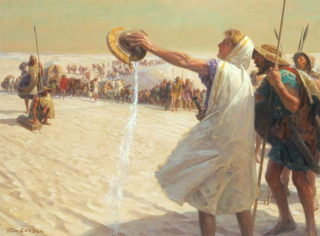
During his period of conquest, Alexander was welcomed in Egypt as Pharoh. He took a significant risk to trace the path of Cambyses to cross the desert to the Oracle at Siwa, shrine of Ammon. Alexander and his companions survived and in contrast to Cambyses, he was declared to be son of Ammon and therefore a God!
Persepolis
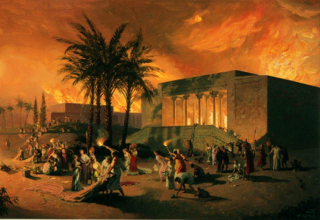 Alexander aided by mercenaries from the Grecian Leagues and City States ( with the exception of Sparta) conquered Persia. He generally strived to be magnanamous in his treatment of the Persians, other than male members of the royal house. But there was an exeption, the burning of Persepolis. Apologists for Alexander say that he burned Persepolis at the urging of Thais, an Athenian hetaera, who just happened to be travelling with his army.
Alexander aided by mercenaries from the Grecian Leagues and City States ( with the exception of Sparta) conquered Persia. He generally strived to be magnanamous in his treatment of the Persians, other than male members of the royal house. But there was an exeption, the burning of Persepolis. Apologists for Alexander say that he burned Persepolis at the urging of Thais, an Athenian hetaera, who just happened to be travelling with his army.
Thais
 Apparently Thais gave a passionate speech to convince Alexander that the temple and palace of Persopolis should be destroyed. She was vivacious, influential and politically active, a product perhaps of the school founded by Aspasia. She later married Ptolemy the Macedonian general who became Pharoh. Some Egyptian geneologies show her as an Eqyptian princess. The theme we are pursuing is that she could be both an egyptian princess and a product of Aspasia’s school in Athens.
Apparently Thais gave a passionate speech to convince Alexander that the temple and palace of Persopolis should be destroyed. She was vivacious, influential and politically active, a product perhaps of the school founded by Aspasia. She later married Ptolemy the Macedonian general who became Pharoh. Some Egyptian geneologies show her as an Eqyptian princess. The theme we are pursuing is that she could be both an egyptian princess and a product of Aspasia’s school in Athens.
Why was the temple at Persopolis burned. This was in fact one of the main objectives of Alexander’s campaign. To gain contol of Asia and prevent the Zarathrusran code continuing as the state “religion”.
The death of Alexander
Alexander died at only 33 and his empire fragmented, but remained under control of his closest friends. Egypt was inherited by Ptolemy and the Persian empire by Seucleus. In Egypt the policy of inbreeding continued. It is not impossible that Ptolemy was Alexander himself, satisfied by ruling his homeland. His mother, Olympias, his wife Roxanne and his son Alexander were all supposed to have died, but they too may have simply moved to Egypt where they could have changed their names and identities! Examination of Egyptian history indicates that a death was not always a death but simply a termination of a position of high office.
Pharonic succession
Despite having five wives and many children, Ptolemy chose Ptolemy Philadelphus as Ptolemy II, Philadelphus was by no means his eldest male child! However Philadelphus mother was Berenice I who apparently was Macedonian but had the distinction of also been cared for by the ubiquitous Lagus. We must suspect that Berenice was another half sister. Ptolemy II then married his sister and her daughter. His son married his first cousin and so on, for generation after generation.
The Seuclids
The Ptolemies then interbred with the Seuclids of Syria, desendants of Seucleus, aother of Axexanders close friends, who now ruled the core area of the Persian empire conquered by Alexander. The same line breeding techniques used in Egypt were utilized. For this to have any meaning it must mean that they all believed they were descended from Gods. The teachings of Zarathrustra were therefore particularly offensive as they acknowledged no physical form for Ahura Mazda, the power behind the universe.
The Magi
To counteract the hold of Zarathrustra’s teaching on the general population, the role of the Magi was again enhanced. Temples were built and sacrifices introduced. Extra “wise” books were added to Zarathrustra’s code. Ahura Mazda, became the good god and Ankareh Minu was promoted as the bad god. It now could be called a religion . There were gods to worship a God! Both Greeks and Romans were satisfied. A greek philosopher sighed contentedly “Ahura Mazda is really Zeus”. The religion became known as Zurvanism then Zoroastrianism. Egypt, Syria and Greece were well satisfied with their work, the teachings of Zarathustra had been modified to make them similar to Egyptian beliefs. At first the underlying code of ethics practiced remained unchanged but slowly but surely the brilliance of Zarathrustra’s beliefs and teaching dimmed, to be held true by only a select few.
The rise of Rome
The four of the major religions of the ancient world were now fully defined. Greek, Egyptian, Jewish and Zoroastrianism. They all intersected and overlapped, both in philosophy, beliefs and perhaps, more importantly, geographically. In the meantime however another power was rapidly rising. In 200 BC Rome defeated Carthage and by 150 BC all of Italy was finally controlled by Rome. Rome now looked to extend its influence even further. Egypt prepared to protect its interest by infiltrating the Roman Republic.
The Republic
Incredibly Rome looked east before it had finally secured its northern and very vulnerable borders, why did they do that?
As Rome looked to the east all the major nations were now ‘Hellenic” sub components of Alexanders Empire . Despite occassional squabbles the were all effectively satellites states under Egyptian influence.
Could the Egyptians find a way to subjugate Rome?
